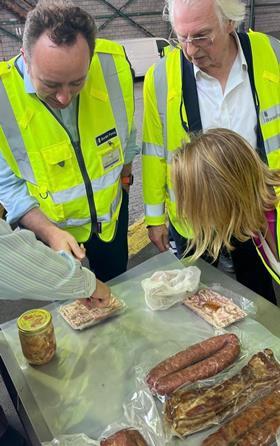Members the All-Party Parliamentary Group (APPG) witnessed the efforts underway to uphold the UK’s biosecurity during a visit to meet with UK Border Force.

The APPG on UK Food Security were invited by the National Pig Association (NPA) to travel to Dover and meet with officials from Border Force and Dover Port Health Authority (DPHA).
This visit followed an APPG meeting in December when DPHA came to Parliament to talk through the risk posed by the illegal import of banned products of animal origin (POAO).
During both this earlier meeting and the visit last week, APPG members saw a range of examples where meat and POAO had been brought into the UK illegally – not just through the personal import route, but also smuggled into commercial loads as well.
NPA reported that some of the commercial loads had illegal POAO “well-hidden” amongst legitimate consignments and were “due to clear customs unchecked owing to flaws in the post Brexit commercial imports system”, known as BTOM. Had DPHA not undertaken random spot checks on these vehicles, this illegal POAO would have entered the country, said NPA.
Dover increases amount of illegal meat seizures made

Since 2022, Dover has been specifically working to seize goods owing to the threat posed by African swine fever (ASF), and more recently from foot and mouth disease (FMD). The authority have now seized more than 243 tonnes of product since October 2022, despite limited funding and only a small percentage of vehicles being checked. NPA said it looks as though this year’s figure will, just over half way through 2025, very shortly overtake the total seizure for the whole of 2024.
During the course of the visit, APPG members Helen Morgan and Danny Chambers, both Liberal Democrat MPs, and Crossbench peer Lord Trees, toured both the tourist and freight lanes with DPHA’s Lucy Manzano. They witnessed the procedures the teams undertake as well getting hands on with some of the recently seized products.
NPA stated that the recently agreed deal, and future SPS agreement, with the EU is a “welcome first step” and will “negate the need much of the flawed BTOM implementation”. However, it also highlighted that the deal is unlikely to come into force for a number of years and “does not reduce the risk posed by illegally imported POAO, especially from malign actors”. NPA went on to say that robust biosecurity “must be a priority”.















